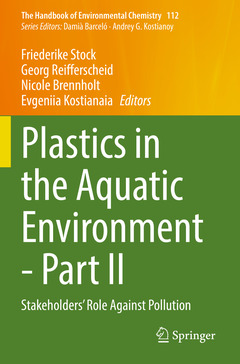Plastics in the Aquatic Environment - Part II, 1st ed. 2022 Stakeholders' Role Against Pollution The Handbook of Environmental Chemistry Series, Vol. 112
Coordonnateurs : Stock Friederike, Reifferscheid Georg, Brennholt Nicole, Kostianaia Evgeniia

This book reviews comprehensively the opportunities and responsibilities of science, society and politics to combat plastic pollution in marine and freshwaters. It provides insights on what information is needed, and from whom, and it outlines policies proposed by various institutions including OSPAR, HELCOM and the European Union. Plastic waste has become a global threat to the aquatic environment that does not stop at country borders. Meanwhile, there are many efforts in science, industry, commerce and governments to tackle the problem worldwide. School education, NGO public actions, voluntary trade reduction measures, governmental management options and governmental regulatory actions are part of the portfolio of efforts to deal with the problem.
Together with the companion volume Plastics in the Aquatic Environment - Part I: Current Status and Challenges, it provides scientists, policymakers and environmental managers with essential reference information on how this problem is being solved, what challenges and barriers are expected and how they can be overcome.
Dr. Nicole Brennholt is a research scientist in the Department of Biochemistry and Ecotoxicology at the German Federal Institute of Hydrology (BfG; Koblenz, Germany) since 2009. She has a Ph.D. in ecology from the University of Essen, Germany. Dr. Brennholt is in charge of national and international projects dealing with (micro-)plastic issues in freshwater and marine ecosystems and microbial water quality. Furthermore, she manages the microbial laboratory (biosafety level 2). With her colleagues she organized several natio
Collects different scientific and societal approaches to tackle aquatic plastic pollution
Explores the challenges and barriers expected in plastic pollution management
Outlines the policies proposed by various institutions including OSPAR, HELCOM, World Bank and European Union
Date de parution : 10-2022
Ouvrage de 285 p.
15.5x23.5 cm
Disponible chez l'éditeur (délai d'approvisionnement : 15 jours).
Prix indicatif 316,49 €
Ajouter au panierDate de parution : 10-2021
Ouvrage de 285 p.
15.5x23.5 cm
Disponible chez l'éditeur (délai d'approvisionnement : 15 jours).
Prix indicatif 316,49 €
Ajouter au panierThèmes de Plastics in the Aquatic Environment - Part II :
Ces ouvrages sont susceptibles de vous intéresser

Microplastic Pollution 126,59 €


